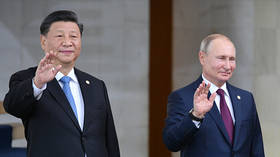Western media is WRONG, Russia & China are NOT going to clash over Covid-19

The mainstream media narrative that the Covid-19 crisis will infect Sino-Russian relations reflects Western elites’ wishful thinking. In reality, Moscow-Beijing ties are likely to get even stronger.
Even before the Covid-19 pandemic, US-China relations seemed increasingly fraught. The coronavirus has only exacerbated the geopolitical rivalry between the reigning superpower and an emerging one. Trying to drive a wedge between your main adversary and their major partners is a time-honored tactic.
Therefore it is not surprising that the Western mainstream media have been pushing the narrative that the coronavirus crisis will badly impair China’s relations with Russia. One of the latest examples is an article in the Financial Times arguing that the Covid-19 crisis “has created wider friction between Moscow and Beijing.”
“As the number of cases imported from Russia grows, so is Chinese anger,”claims FT. “This is likely to boost long-held feelings of Chinese superiority towards Russia and anti-Russian sentiments. In Russia, it’s likely that the virus will reinforce deep-seated Sinophobia.”
Also on rt.com Prague ‘spy thriller’: Western activists rail against 'fake news', but will believe anything if it villainizes RussiaIn fact, there is scant evidence to support FT’s claim about an emerging crack in the Sino-Russian relationship. There are few, if any, substantive indications of the rise in Sinophobia in Russia or China’s outrage at Russia. It is true that back in February there were a number of incidents in Moscow when the city authorities went after Chinese citizens who were allegedly violating self-isolation requirements, with such measures drawing a protest from the Chinese embassy. Those attempts to single out the Chinese were primarily a knee-jerk reaction at a time when China was still the main source of the virus spread. Calling them Sinophobic is debatable. The Chinese embassy in Moscow later admitted that people taken away by police had all violated quarantine rules and in addition to the Chinese included Russians and other nationals.
At the start of the pandemic, Russia moved quickly to suspend almost all passenger traffic with China. However, it took the Russian government much longer to close the border with Europe. This was cited by FT as an indication of “the obvious racism of the Russian elite.” A better explanation for the Kremlin’s procrastination in halting travel with Europe lies in the hard fact that the EU is the biggest destination for Russia’s trade and human flows, still outweighing China by far. When the Russian government, just as most other governments worldwide, was still underestimating the danger of the new virus, isolating Russia from Europe early on would have been a nuclear option – and Moscow, sadly, had neither the guts nor foresight to exercise it.
Also on rt.com Better the virus than Putin? In the information war against Russia, Covid-19 is just another weaponIn late March/early April, when the epidemic started to rapidly spread in Russia, several thousand Chinese citizens, most of them owners of small businesses in Moscow and other large cities, rushed to leave for the safety of China. Many of those who made it across the border tested positive. Quite expectedly, this caused concern in Beijing, leading it to shut off the land border with Russia to all human traffic, including Chinese nationals. But that is hardly “anger” at Russia.
The real Chinese outrage is, of course, directed the other way: at the US and some of its Western allies who are scapegoating Beijing for their own Covid catastrophes. Covid-19 has taken a heavy toll on Russia, too. The country is currently in 7th place worldwide when it comes to the number of coronavirus infections. The epidemic in Russia continues to expand, with the GDP projected to shrink by as much as eight percent. However, if Moscow has any questions to China about the origins of the coronavirus, it is choosing to discuss them in a confidential manner. The Kremlin has stood firmly behind Beijing, with President Vladimir Putin denouncing attempts to put the blame on China.
Similar to mass audiences in the West, an average Russian and Chinese viewer usually doesn’t question what they are shown on TV about relations with other countries. And Russian and Chinese mainstream media have been cultivating the narrative of close collaboration by Russia and China against the common enemy of Covid-19.
In my home region of the Russian Far East, where many people know about the Asian neighbor not only from media reporting but also firsthand, the prevailing feeling is not a grudge against China. The people don’t care whether the virus originated in a Wuhan lab, as the US claims, or elsewhere. Rather, they are anxious about how long the border with China and other Asian countries will stay closed. So many businesses here – from souvenir shops to restaurants to universities – depend on the Chinese, Koreans and Japanese that an extended ban on international travel may devastate the local economy.
Prognostications about a coming discord between Russia and China reflect the wishful thinking of the Western – mostly Anglo-American – elites who are still in denial about the reality of the Sino-Russian strategic alignment, even though these same elites have done a lot to pull the two great powers together. The Moscow – Beijing axis will certainly survive the coronavirus test. If anything, the Russia-China entente is likely to get even stronger in the wake of Covid-19.
Facing an intensifying confrontation with the US, China will need Russia – its only major-power friend – even more. As for Russia, it will hardly be able to recover economically after the pandemic unless China is willing to keep buying its energy and other commodities.
The Russian-Chinese relationship is complex and has its own structural uncertainties that may play out in the long term. But don’t expect Moscow and Beijing to turn against each other any time soon.
Think your friends would be interested? Share this story!
The statements, views and opinions expressed in this column are solely those of the author and do not necessarily represent those of RT.













